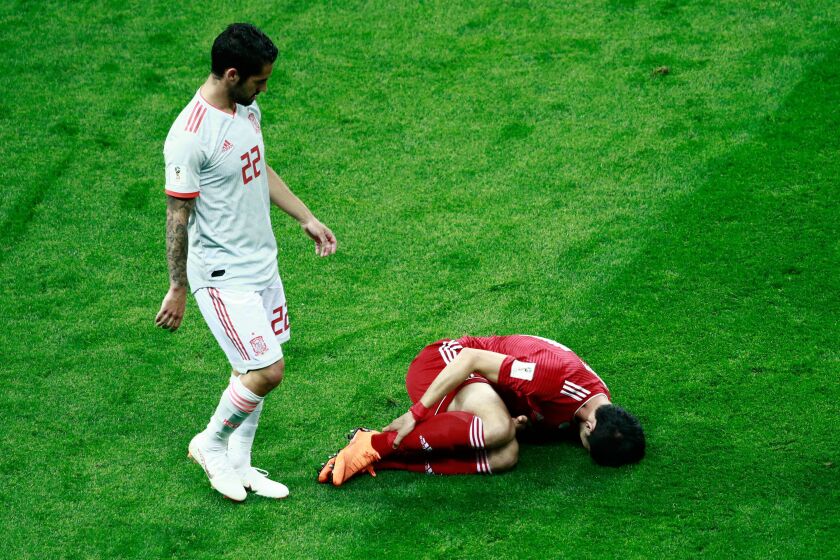The U.S. is great. Except for in the mellifluous realm of soccer, where the proper way to say it is the U.S. ‘‘are’’ great. Then again, nobody ever says that because we Americans aren’t great at all — let alone exceptional — when it comes to soccer, a k a un-American football, at least not on the men’s side. Heading into the World Cup that got underway this week in Qatar, our national team was ranked a modest 16th by FIFA, which, in case you didn’t know it, is short for Federation of Immoral Financial Arrangements.
Our lads drew 1-1 against Wales on Monday in their opening match of a quadrennial tournament the U.S. has (have?) never won. Brazil leads the way with five championships, Germany and Italy have four each, Argentina, France and Uruguay have two apiece and England and Spain one. We’re still stuck on bupkis, but maybe this is our year?
‘‘When Ford F-450s fly,’’ the rest of the world sneers.
If we’re going to shock the soccer world, those of us watching from home — or considering it — at least should understand what we’re hearing and seeing. To that end, here’s a hopefully helpful glossary of World Cup and general soccer terms.
Group stage: Initially, the teams are split into eight groups of four for round-robin play, with the top two in each group advancing. Think of this as keeping track of divisional standings in baseball, only with slightly less ripping on the White Sox.
Knockout stage: It’s a win-or-go-home bracket of the final 16 and the only time fisticuffs are allowed. Remember that when some know-nothing says you can’t use your hands in soccer.
Stoppage time: Typically, it’s three or four additional minutes of nobody scoring goals after 90 minutes of nobody scoring goals.
Extra time: It’s basically overtime — but not sudden death — and happens only in the knockout stage. These are the most excruciating 30 minutes in soccer, not counting the ‘‘Beard After Hours’’ episode of ‘‘Ted Lasso.’’
Sudden death: This is when a player has his calf grazed ever so slightly — or not at all — and throws his body to the ground as though he has been felled by a Howitzer blast.
Penalty kicks: Tense and at times brutally cruel, it remains the punishment doled out to a player who fails to catch an opponent pinning a ‘‘kick me’’ sign on the back of his shorts.
Concede: It’s really just a fancy word for giving up a goal — and what you don’t do when you lose an election.
Goalpost: It comes into play when the netminder, often a very tall man wearing gloves and a strange shirt, presses ‘‘send’’ on an Instagram photo or a tweet.
Referee: This is the person running about the field with the players in a theatrical display, giving admonishing looks and issuing stern commands willy-nilly and pausing only to write entries into some sort of private journal.
Assistant referees: They are tasked with a single duty, which is to hoist a tiny flag straight overhead whenever something too exciting is about to happen.
Offside: This is when an offensive player is in the opponents’ half of the field and gets behind the defense before being passed the ball. But enough about the Bears.
Yellow card: It’s very much like a personal foul in football, only no 15-yard penalty is assessed and a tremendous amount of acting is involved.
Red card: Get one of these, and your team must play down a man for the rest of the match. It’s like if a hockey team had to go on a 20- or 30-minute penalty kill, only with very little threat of being scored upon.
Tackle: This is one of the beauties of the game, a player sliding cleanly to separate the ball from an opponent. But note: If anybody gets too good at it, Ryan Poles immediately will try to trade him.
‘‘What a ball!’’ This is what someone in your midst yells whenever a player makes an especially good pass.
‘‘What a pass!’’ This is what someone in your midst who’s pretending to know soccer yells whenever a player delivers an especially good ball.
VAR: Soccer’s instant-replay system is known by this acronym, which stands for video assistant referee. Score another one for the freakin’ robots over working men and women, right?
Set piece: This is the name for an anticlimactic kick before which players from both teams waste much time pushing, shoving and randomly jockeying for position in front of the goal.
Handball: It’s never good if one of your players carelessly allows the ball to deflect off any part of his outstretched arms. But enough about Bears receivers.
Golden Boot: The World Cup’s top goal-scorer receives this coveted award, the holy grail for all the greatest players. Alas, the U.S. never has won the Boot, either. And that makes us the definition of ‘‘overdue.’’







